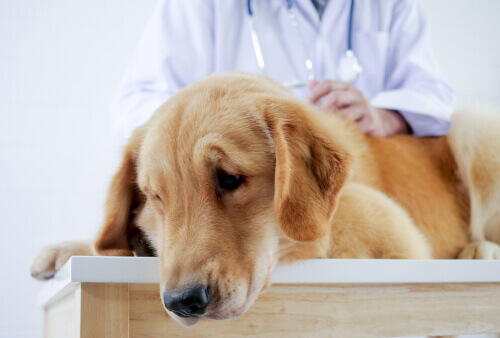What to Do if Your Dog Ingests Poison

Toxic substances are within the reach of dogs on many occasions. Many times by accident, they may inhale toxic substances while sniffing traces during their daily walks. On other occasions, someone may have left some sort of poison as a means of pest control. Given the risks, it’s important to know how to respond if your dog ingests poison. In the article below, we’ll tell you what you need to know.
What is poison?
I remember my first class of toxicology in the university. The professor, after entering the classroom, approached the chalkboard and, without speaking, began to write. “Everything is a poison, nothing is a poison. It is the dose that makes the poison.” With this brilliant affirmation, the 16th-century doctor Paracelsus magnificently illustrated the matter at hand.
Any substance can be potentially poisonous if you consume enough of it. Obviously, there are substances that have a greater toxic potential than others. However, in order to produce this toxicity, they need to reach a specific dose, known as the minimal lethal dose.
It’s important to clarify this since there are many dog owners that rush to the vet because their dogs have consumed things like a grape, a piece of onion, or a small chunk of chocolate.
While it’s true that these substances are toxic for dogs, the accidental ingestion of such small portions doesn’t pose a threat. Now that we’ve made this clear, let’s go on to talk about what you should do if your dog ingests poison.

What to do if your dog ingests poison
Contact your veterinarian
Of course, the first step you should take will be to contact your veterinarian in order to explain the situation. You’ll need to mention all of the symptoms that you observe in your dog, such as the following:
- Fever
- Salivation
- Diarrhea
- Vomiting
- Muscle spasms
- Paleness in the mucus membranes
- Bleeding
- Breathing difficulties
If possible, you should explain the characteristics of the possible poison that your dog has ingested. If you have the product label, you should read the ingredients to the vet.
In some cases, you may suspect that your dog has ingested poison, but you’re unsure what, or when. In that case, try to remember everything your dog has done in the past few hours:
- Things like going for walks in certain areas, ingesting garbage, contact with mice… Any clue can shed valuable information regarding the nature of the poison. Identifying the culprit is an enormous advantage when it comes to proper treatment.
Induce vomiting
If you’re sure that your dog has ingested some sort of poison, then inducing vomiting is easy. All you need to do is give your dog water and hydrogen peroxide to drink. Mix three parts water with one part hydrogen peroxide and force your dog to drink it. Then, take your dog for a small walk to make the mixture effective. In just a few minutes, your dog will start to vomit.
Another important aspect to keep in mind is that you should never induce the vomiting of any corrosive substance. Doing so can be even more harmful to your pet.

Neutralize the poison
If you can’t identify the poison, then you can’t identify the antidote. However, there’s always something you can do. The use of activated carbon has proven to be very useful when it comes to the ingestion of a wide variety of poisons.
- This substance limits the absorption of toxins in the stomach. Therefore, you can use it in any case of poisoning.
Wash the poison
Even if ingestion doesn’t take place, mere skin exposure to poison is just as common.
There are many possible toxins that can enter a dog’s body through the skin. Therefore, if your animal shows signs of intoxication and has spent time in areas where phytosanitary products may have been used (gardens or crop fields), you should eliminate the toxin from the skin.
Without a doubt, it’s alarming for any dog owner when your dog ingests poison. Just the same, the above tips and the assistance of a trusted veterinarian will help you and your dog get through this unfortunate event.
This text is provided for informational purposes only and does not replace consultation with a professional. If in doubt, consult your specialist.